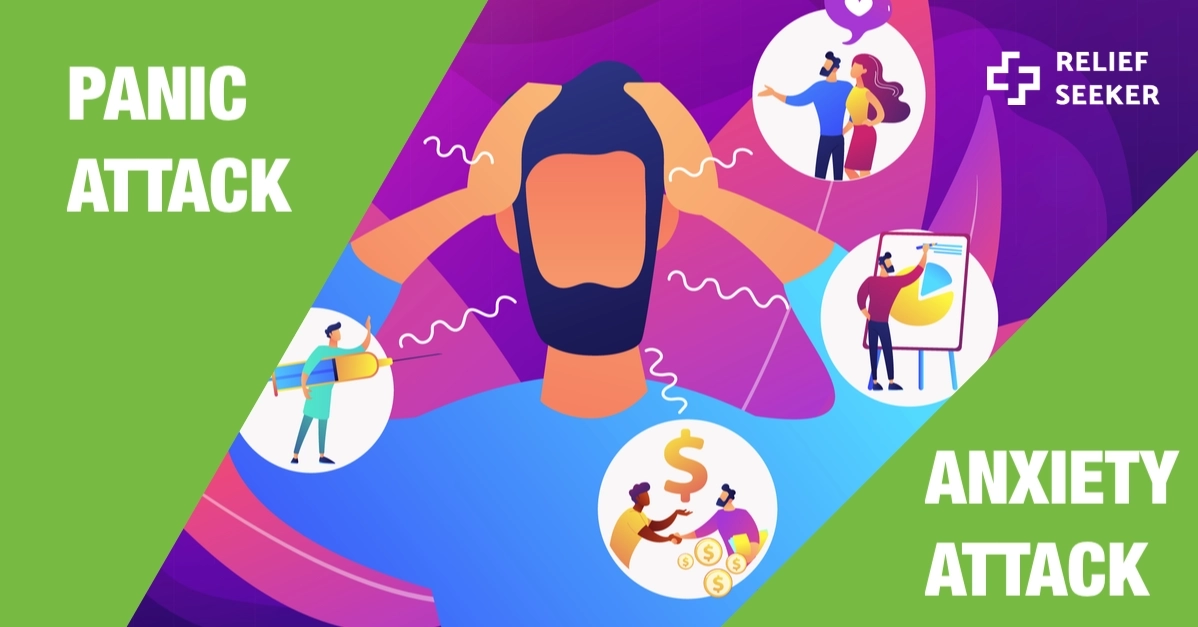Let’s face it, 2020 has thrown us all for a giant loop. It has forced many people to face their worst nightmares, driving their anxiety through the roof. As of late, mental health has been top of mind, with many people talking about their own mental states and trying to find the best anxiety treatments. During these times, it is not uncommon to hear those around you talking about anxiety attacks and panic attacks, with many not knowing the differences between them when in reality, these are two quite different conditions.
Panic Attacks vs. Anxiety Attacks Snapshot
| Anxiety Attacks | Panic Attacks | |
| Duration | One day to several years | Ten minutes to one hour |
| Symptoms | Emotional/Mental: Fatigue, irritability, constant worrying, concentration issues | Physical: Hyperventilating, shaking, increased heart rate |
| Causes | Triggered by a situation or event | May, or may not have a trigger and can occur at any time, unexpectedly |
| Indicated a Disorder | Can occur without a psychological disorder | Can indicate the presence of a psychological disorder |
| Recognized by DSM-5 | No | Yes |
What is a Panic Attack?
The Mayo Clinic defines panic attacks as “a sudden episode of intense fear that triggers severe physical reactions when there is no real danger or apparent cause.” Panic attacks can be very frightening, both mentally and physically. While an attack occurs, you might feel as though you’re going to die; your heart rate becomes elevated, you can have shortness of breath, or even feel nauseous. In the most recent edition of the Diagnostic and Statistical Manual of Mental Disorders (DSM-5), panic attacks are recognized as a mental health disorder and categorize as unexpected or expected.
Most panic attacks are expected, being cued by your external environment, such as a high-stress deadline at work. Unexpected panic attacks happen out-of-the-blue and a lot of the time for no reason. Unfortunately, panic attacks can happen to anyone, but if you have experienced more than one, you may want to consult a medical professional.
What is an Anxiety Attack?
Unlike panic attacks, anxiety attacks aren’t recognized in the DSM-5, as anxiety attacks are more difficult to pinpoint. The lack of diagnostic recognition makes the signs of an anxiety attack open to interpretation. For example, one person’s description of the anxiety attack they had last week could be completely different from the anxiety attack you experienced in the past. However, The DSM-5 defines anxiety as a characteristic of several common psychiatric disorders.
Anxiety is usually brought on by worry, distress, or fear. It can be related to internal or external stressors, such as an upcoming event, a past experience, or other stressful situations.
Symptoms
To most, panic and anxiety attacks can feel very similar, as they have a lot in common when it comes to the emotional and physical symptoms.
Many people who suffer from anxiety will experience both mental and physical symptoms. The most common mental/emotional symptoms include:
- Failure to focus on tasks
- Depression or other mental health issues
- Constant worrying
- Irritability
- Irrational thoughts
- Obsessive thoughts
- Overreaction to normal events
- Not being able to enjoy daily activities
These emotional symptoms of anxiety can ultimately lead to the occurrence of a panic attack. For example, you could be feeling anxious while worrying about a stressful situation, and if/when the situation arises, a panic attack hits you like a ton of bricks.
Panic attacks are more physical and can often feel as though you might not live through it. Physical symptoms of a panic attack can include:
- Trembling
- Racing heart
- Stomach pain
- Weakness
- Dizziness
- Breathing problems
- Nausea
- Sweating and chills
After reading this far, you still might be confused about the differences between an anxiety attack and a panic attack. It is complicated to know which symptoms are associated and if you’re experiencing anxiety or a panic attack. If you still have questions, please keep the following in mind.
- Anxiety is essentially the feelings we experience when we worry about events; past, present, and future. Whether we’re anticipating a bad outcome or mulling over what we could have done, anxiety attacks usually bring on muscle tension, a general feeling uneasiness, and usually come on steadily.
- A panic attack is different. Come on very abruptly with an intense fear of what’s happening at that specific moment, instilling a flight-or-flight response. It sets off an alarm in your brain, alerting you to take cover and protect yourself from imminent danger.
- Anxiety attacks and panic attacks can both be mild, moderate, or severe. However, anxiety can stay on the back burner, allowing you to go about your day as normal.
- Panic attacks are more physical and can be triggered by subtler cues or bodily sensations, such as back pain. For example, a person could misinterpret lightheadedness with having a stroke, causing so much panic that an attack then occurs.
- Most people are hardwired to experience both anxiety and panic attacks. Still, only some are more prone to worry and be anxious if they have a sensitive nervous system, especially if they grow up around other worriers.
What Causes Anxiety Attacks and Panic Attacks?
Many causes come along with experiencing a panic or anxiety attack. As stated before, unexpected panic attacks can come out of nowhere, with unexplainable triggers. On the other hand, expected panic attacks and anxiety can be triggered by similar things. Some triggers are very minimal, with others being super severe. Common triggers include:
- Social Phobias, such as Social Anxiety Disorder
- Withdrawal from drugs, alcohol, or caffeine
- A stressful job or tight deadlines
- Overthinking certain situations
- People that are also overly anxious
- Fears, such as crowded spaces, small spaces, or heights.
- Things that remind you of an unsavory experience or memories of traumatic experiences
- Pain, especially chronic pain
- A temperament that is more sensitive to stress or prone to negative emotions
- Certain medications, such as stimulants like Adderall or Ritalin
- Genetics
What are the Risk Factors?
Symptoms of panic and anxiety attacks can start as early as your late teens and usually affect more women than men. Factors that may increase the risk of having an anxiety attack or panic attack can include:
- Genetics: Family history of panic attacks or panic disorder
- Life stress: death or serious illness of a loved one
- Traumatic life events: sexual assault or a serious accident
- Life-changing events: birth, or addition of a child or divorce Smoking or excessive caffeine intake
- History of childhood physical or sexual abuse
- Ongoing stress: work responsibilities, conflict in your family, or financial woes
- Having an anxious personality
- Surrounding yourself with other people that are constantly stressed out or anxious
- Putting yourself in situations that you already know make your fearful, nervous, or anxious
It is important to keep in mind that just because you’ve experienced anxiety doesn’t mean you’re going to have a panic attack. It does mean you are more prone to experience a panic attack and consider talking to a medical professional.
Reaching a Diagnosis
If you’re feeling like you’re experiencing symptoms of panic or anxiety attacks, it is important to talk to your doctor or another medical professional because if these symptoms are left untreated, they can affect your everyday life, which can create lifelong complications that have the ability to ruin your quality of life. Complications that panic and anxiety attacks may cause can include:
- Phobias: fear of driving, social situations, or leaving your home
- Frequent medical care
- Problems at work or school
- Mental Health problems: Depression and other psychiatric disorders
- Suicidal thoughts and/or suicidal attempts
- Alcohol or drug abuse
- Problems with finances
- Relying too heavily on friends and family
- Relationship turmoil
- Loss of friendships or love relationships
If you worry about what you’re experiencing and want to know more, seeking medical advice from your doctor is the best option. Once you make an appointment, your doctor will ask you a series of questions regarding your symptoms and conduct other tests to ensure there are no other existing health conditions. To get a proper diagnosis, your doctor will most likely give you a physical exam, draw your blood, and ask you specific questions related to your psychological status.
Treatment and Prevention Options for Anxiety Attacks and Panic Attacks
Unfortunately, there's no silver bullet to preventing panic or anxiety attacks. However, you can look into things to make sure what you’re experiencing doesn’t become worse or happen more frequently.
- Home remedies
- Medication
- Modify your lifestyle
Home Remedies
Home remedies are best for people who want to take a more holistic approach to prevent and treating anxiety and panic attack symptoms. The following suggestions should be super helpful if you feel a panic or anxiety attack coming on to help you feel more in control.
- Retrain your breathing: Breathing is one of the most important things you can do for yourself if you’re having an attack. Generally, during an attack, people are hyperventilating. One thing you can do to ease this is to focus all your attention on the in and out of your breath; inhale deeply, count to five, then exhale.
- Be in the Moment: Being in the moment and facing what’s happening head-on can be super challenging, but if you can get to a place where you’re able to accept what you’re experiencing by realizing this too shall pass, you will then be able to move forward and on with your day.
- Simply relax: This is hard for most people to do, but even more so when you’re having an attack. There are many techniques you can try to calm your nerves, such as closing your eyes, meditating, or taking a warm bath.
Medication
When considering the path you’re going to take to manage your panic and anxiety attacks, it is imperative to consult your doctor, especially if you decide that prescribed medication is right for you. Talk to your doctor about how you’ve been feeling, and together you can figure out which medication will work for you. It is important to note: taking any medication that isn’t prescribed by a medical professional is not a good choice and can be very harmful.
Modify Your Lifestyle
This is probably the easiest way to start getting your health under control. Taking little steps to improve your overall health may help you prevent anxiety and panic attacks as well as reduce the severity and frequency of symptoms. Some things you can do to modify your lifestyle are:
- Join a support group or talk to other people that you know that suffer from the same or similar symptoms ->; check out Wisdo to find a group for you.
- Eat a more balanced diet and exercise regularly.
- Look into Online Therapy - We have pre-vetted and reviewed a bunch of providers; you can check them out here. One online therapy provider that we highly recommend is Talkspace
- Limit your alcohol, drug, and caffeine intake
- Talk to friends and family - sometimes it can be shameful to admit that what you’ve been experiencing is scary for you, but talking to someone that knows you well will understand and want to do whatever they can to help you through it.
That’s a Wrap
It's probably safe to say that most people have experienced feelings of anxiety and depression. We know all too well what these symptoms look and feel like. Panic attacks and anxiety attacks are not the same; in fact, they are very different. One affects you physically and the other more mentally/emotionally, but both are scary!
Both have risk factors that could, if not treated properly, begin to affect your everyday life. There are many options for remedying panic and anxiety attacks, but one thing is for sure -- do not go at this alone. Start by first talking to your doctor; together, you will be able to figure out a way to manage your stress.
Whatever you decide to do, please continue to remind yourself that you are not alone; there are people out there that want to see you get the help you need to take control of your mental health.


